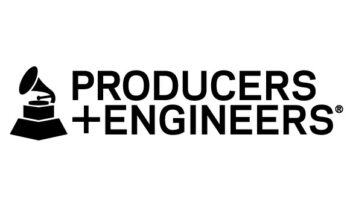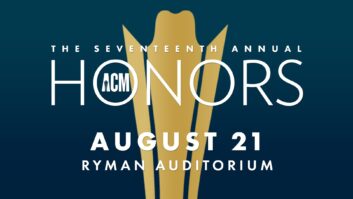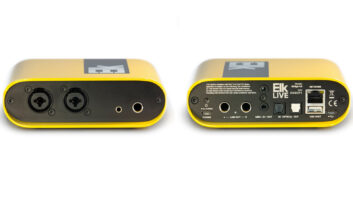A loving home provides a good base for anything people do, but at Brownstone Recording (www.brownstonerecordingstudio.com), it’s been the perfect foundation for a personal studio designed to minimize overhead and maximize productivity. Founded in the heart of Harlem by professional drummer Warren Henry to satisfy his ever-growing passion for recording, the studio takes full advantage of its location in an architectural icon — a New York City brownstone residence — to provide a compact but serious tracking experience to an appreciative clientele.
One-half of Taqa Entertainment — a joint venture between Henry and producer Barry D., who operates a sister mixing facility in Valley Stream in Long Island (www.taqarecordsusa.com) — Brownstone Recording regularly hosts jazz, R&B, hip hop and gospel clients. “We had all this space down here, but I had to bypass all the plumbing and make the space look like a studio,” Henry says of the basement facility’s 1997 startup. “I was doing a lot of MIDI, but the requests were, ‘Can we record live instruments?’ In 2002, I finally got up the nerve to put a sledgehammer in the ceiling and do the whole demolition. I’ll never do something like that myself ever, ever again! It’s a lot of work and you need a crew.”
Working in the intimate live room or any other appropriate part of the house, Henry can record his beautiful custom drum kit, vocals and anything else just fine, connecting to his Pro Tools — equipped control room via a carefully selected group of AKG, Neumann and Shure mics. Mic pre’s and outboard gear are equally select, including Avalon and Focusrite pre’s, Apogee converters, dbx compressors and Lexicon reverbs.
“My philosophy has always been that if you’re limited with your resources, try to buy the best your money can afford,” he notes. “People will buy cheap stuff and wonder why they’re buying over and over again. When I got interested in the Avalon 747, for example, I called them and said point-blank, ‘What is it about your mic pre’s?’ I studied Class-A electronics and found that the design is ultra-quiet with a ton of headroom. Then I saw that a Focusrite is designed that way and got the TwinTrak Pro, which I use as my front end for vocals and stereo overheads for drums.
“Another thing that intrigued me was the quality of optical compression. If you drive analog compression to a limiting range, it has a tendency to breathe and swoosh and give you artifacts, but when you nail optical compression, it gives you a musical sound. My dbx 163s, on the other hand, are inexpensive units, but they sound good; plus, it’s not complicated circuitry. You can run a bass guitar through it nice and fat, and it gives vocals the touch of compression that you need.”
The brownstone’s solid construction — along with his squad of kids — gives Henry some built-in assets to play off of. “The plumbing [infrastructure] makes an unbelievable bass trap, and two corner traps provide outstanding bass imaging. I really don’t have a lot of problems with the neighbors because of the extra concrete that was poured into the floor, and when I opened the ceiling and saw 10×12-foot joists, I packed them with a ton of kids’ clothes I had, along with R13 sheets of Fiberglas.”
While Henry is no slouch at mixing, he’s more than happy to pass that task off to Barry D. once he’s captured the sounds. “Warren likes to record and I like to mix,” Barry D. explains. “I look at mixing as painting a picture. You want to make things red or blue. I say, ‘I’ve got the music, I know what it needs and I need to realize the picture I have in my head.’ It starts with a vision.”
While the Taqa partners are happy to be busy, after several years of growth in the tough New York scene, they have serious ambitions about the next level. “The nature of the business being that all the major recording facilities are going down, we would actually like to be a new up-and-coming Hit Factory,” says Barry D. “It’s a sad thing to see the studios close down. There’s so much history, and we want to be a part of the resurgence of the studios coming back. It’s a lofty goal, very much so.”
For Henry, achieving that means a relentless regimen of higher and higher learning. “As you educate yourself on various levels, you’re able to make more informed and intelligent decisions as a professional,” he concludes. “I’ve never been afraid to go up to someone and ask them, ‘How did you get that vocal sound?’ Don’t be afraid to educate yourself and ask as many questions as you can. I’m just trying to better myself and turn out big sounds in a micro-circumstance.”
David Weiss is Mix’s New York editor.




